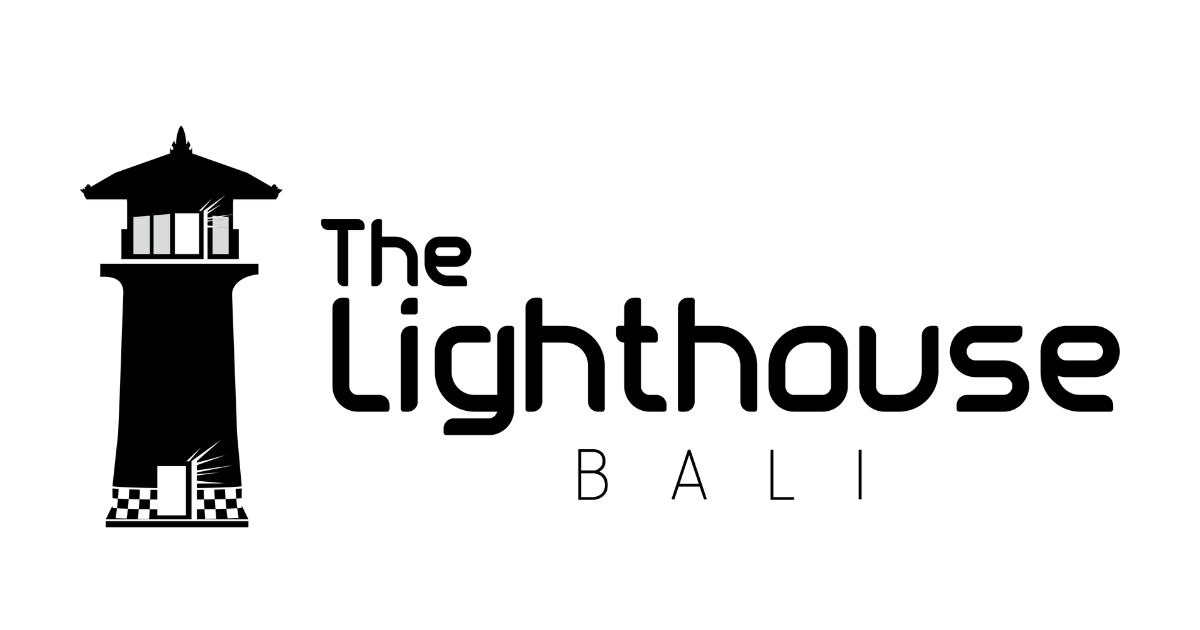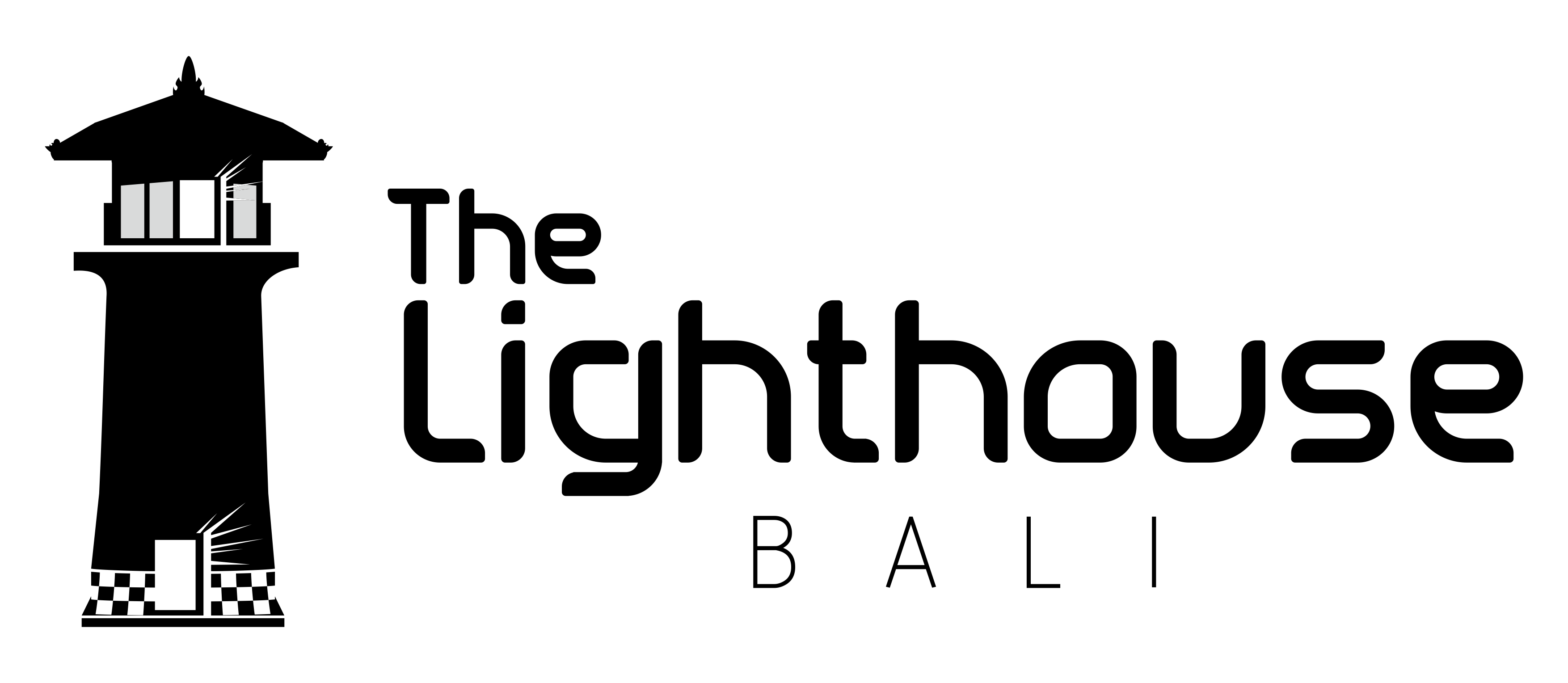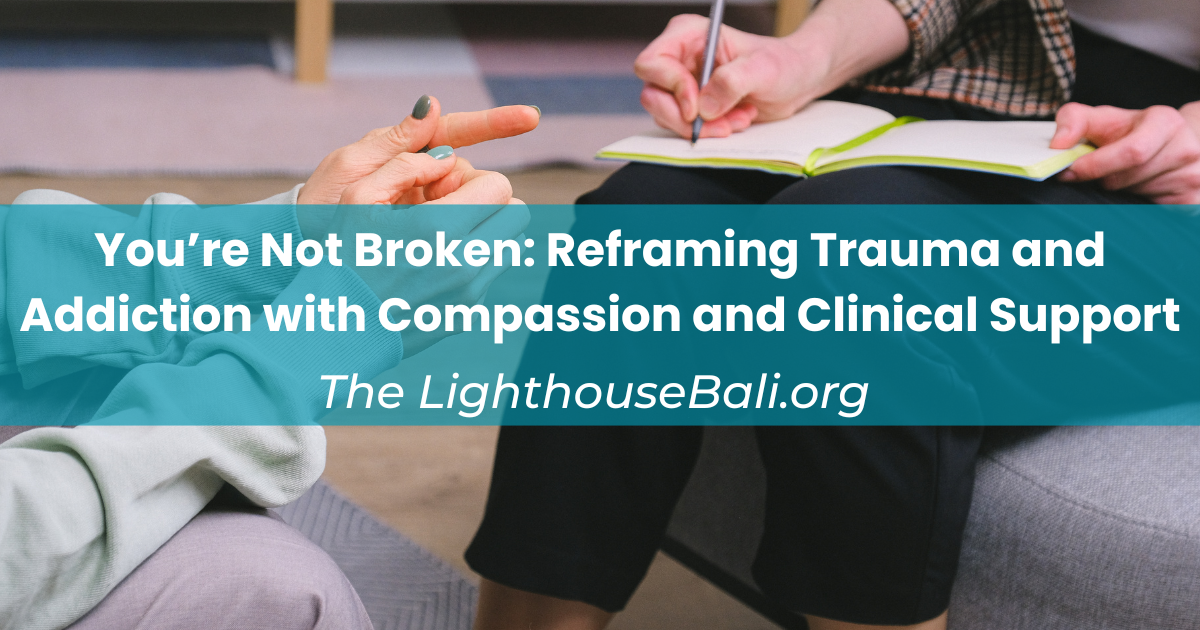You’re Not Broken: Reframing Trauma and Addiction With Compassion and Clinical Support
When trauma and addiction become enmeshed in your life, it’s easy to feel lost or disoriented, perhaps even broken or stuck.
It’s important for you to know you are not alone in this. Many people who have experienced trauma in their lives struggle with a similar narrative.
At The Lighthouse Bali, we view recovery through an empowering lens. You are not broken. You are simply navigating through challenging circumstances that may have caught you off guard, leaving you feeling overwhelmed and unprepared.

With our evidence-based treatment programs and personalized approach to healing, we can help you rewrite your recovery narrative in whatever way feels the safest and most supportive to you.
In this article, we will explore how The Lighthouse Bali can help reshape your journey toward emotional health and well-being through tailored trauma-informed care and powerful reframing tools that enable you to sustain sobriety and wellness.
In the meantime, if you are concerned about your (or a loved one’s) substance use, contact our professional team in Bali today to learn more about our personalized substance abuse recovery programs.
You do not have to face these struggles alone.
Our dedicated and experienced multidisciplinary team is here and ready to guide you through your unique recovery journey in a private, peaceful environment that allows you to reflect, heal, and recover.
Speak to a Lighthouse Bali specialist today.
Reframing Trauma and Addiction with Compassion and Clinical Support
Trauma and addiction don’t define who we are.
However, the stigma and misconceptions surrounding these mental health challenges can almost become a part of our identity, particularly if we don’t have enough understanding and support from those around us.
With the right combination of compassion, “whole” person support, and evidence-based treatment, you can begin to recognize unhelpful coping patterns and break free from survival mode, allowing you to thrive, not just survive.
Here are several ways we can help support you on that journey:
1. Trauma-Informed, Addiction-Sensitive Care
Many individuals who struggle with substance use disorder or other compulsive behaviors like gambling or workaholism often engage in these patterns to escape, numb, or block out painful memories or unresolved emotional wounds.
One of the trickiest aspects of almost all addictions is that the behaviors can seem helpful initially.
For instance, substances like drugs and alcohol can provide the relief or distraction many individuals seek, often outside of their awareness.
However, once the effects of a substance or behavior begin to wear off, the bad feelings start to creep back in, often with a vengeance, and the individual finds themself back at square one.
Trauma-Informed Care Bali
The Lighthouse Bali team is specially trained in trauma-informed addiction treatment and care. This means we consider the “whole” person, not just their symptoms or presentation.
Our team uses a wide range of evidence-based treatments and experiential approaches to help you get the best recovery outcome possible.
These include Cognitive Behavioral Therapy (CBT), EMDR (Eye Movement Desensitization and Reprocessing), mindfulness-based therapy, and other somatic practices to help you reprocess trauma and understand how it may fuel your addiction.
This combination of compassion and clinical care means that individuals can engage in programs that allow them to reframe trauma and addiction through a more empowering lens instead of being held back by old narratives that no longer serve.

2. EMDR: Rewiring the Brain’s Response to Trauma
Eye Movement Desensitization Reprocessing therapy (EMDR) is a pioneering trauma treatment originally developed by Dr. Francine Shapiro in the late 1980s.
This psychotherapeutic approach helps individuals reprocess traumatic memories and experiences so they no longer trigger distress, cravings, or emotional overwhelm.
EMDR uses bilateral stimulation (side-to-side eye movements) and other somatic techniques to help release emotional energy that may have been stored in the body during a traumatic event.
Once the emotional charge of traumatic memories is released, individuals can make space for deep healing and recovery – free from the past.
EMDR: A Brief History
In 1987, psychologist Francine Shapiro made a groundbreaking observation while walking through a park: she noticed that her eye movements seemed to reduce the emotional intensity of her own troubling memories.
Intrigued, she began to explore this phenomenon further and discovered that others experienced similar relief when using guided eye movements.
However, Shapiro soon realized that eye movements alone weren’t enough to produce lasting therapeutic change.
To enhance the effectiveness of the process, she integrated cognitive reframing techniques and formalized the approach into a structured method known as Eye Movement Desensitization (EMD) – the early version of what would later evolve into EMDR therapy.
Trauma Treatment Bali
At The Lighthouse Bali, our trauma programs are facilitated by certified specialists with extensive experience in treating all types of addiction and trauma, including single-event trauma and repeated experiences of adversity such as C-PTSD.


Our Lighthouse Bali Trauma Expert
Dr. Andre is a Registered Clinical Psychologist (HCPC) and an Accredited Clinical Supervisor with the British Psychological Society (BPS).
Trained in Germany, she has dedicated her career to understanding the complexities of the human mind and behavior.
Her practice is rooted in integrative therapy, with a strong emphasis on building self-awareness, identifying unhelpful behavioral patterns, and supporting the healing of unresolved trauma.
Dr. Andre tailors her therapeutic approach to meet the unique needs of each client, creating personalized treatment plans designed to address individual symptoms, allowing clients to reframe trauma narratives that may cause or worsen addiction.
3. Sober Companions: 24/7 Support Through Vulnerable Moments
Many clients transitioning out of inpatient treatment, or those needing continued structure and care, benefit significantly from our sober companion service, which can be an invaluable component of additional support.
Sober companions are trained professionals who are in recovery themselves.
These individuals offer one-to-one support, real-time accountability, and emotional grounding for clients transitioning from residential treatment to the next phase of recovery.
Understandably, life after inpatient treatment can feel daunting to some – particularly those navigating stressful events, rebuilding routines and structures, or integrating after treatment.
A sober companion can guide you through uncertain periods, helping you apply the tools you learned in treatment while remaining sober and safe.
Our dedicated sober companions service is designed to meet your specific needs and goals, with individuals who have walked a similar path and can help you reframe your past experiences so you can view them in more healthy, empowering ways.
4. A Shift from Shame to Self-Compassion
We feel that shame is often at the heart of addiction.
One of the most transformative aspects of long-term recovery is learning to replace chronic shame with self-compassion.
This primarily involves exploring ways that you may be blaming yourself for how you’ve survived or coped so far.
At The Lighthouse Bali, we work with you to understand your unique coping styles and the neurological patterns that may drive your addiction.
Through peer support, mindfulness practices, and compassion-focused one-on-one therapy, we support you in reframing your story – from one of “brokenness” or “failure” to one of survival and resilience.
5. Personalized Recovery Plans and Clinical Expertise
The moment you arrive in Bali, you’ll be gently guided by our multidisciplinary team of professionals.
Our team comprises addiction specialists, trauma-informed professionals, medical doctors and wellness practitioners who will work with you to develop a tailored treatment plan based on your unique needs, treatment goals, and preferences.
Depending on the outcome of your assessment, your treatment program may include a combination of medical detox, individual therapy, trauma-informed treatment, peer support, and holistic care, which our clinical team will coordinate.
This integrated approach to care is profoundly transformative, as the treatment models used (i.e., CBT and EMDR) can help you view your past from an entirely different lens, enabling you to see yourself as a survivor and not a victim of past circumstances.

6. Comprehensive Aftercare and Support
Our team understands that the end of treatment marks the beginning of long-term recovery.
Therefore, we provide a comprehensive aftercare and support program to help you navigate life once you return home from treatment.
This service may include:
- Online counseling sessions
- Sober companion access
- Weekly check-ins
- Psychoeducation
At The Lighthouse Bali, we help you rebuild a sustainable recovery lifestyle that allows you to maintain any progress made in treatment through our personalized aftercare support programs.
Final Thoughts
For individuals who have experienced trauma, reframing their stories can be a powerful path to healing.
By reshaping fragmented or painful memories into a clear and meaningful narrative, individuals begin to make sense of what happened instead of the disorientation and shame that often come with these experiences.
In doing so, they shift from feeling powerless to reclaiming a sense of agency and strength – transforming their identity from one marked by survival to one defined by resilience and growth.
And these shifts can be incredibly powerful for those recovering from trauma and addiction.
Next Steps
To learn more about our trauma and substance abuse recovery programs, contact our professional team today, who will gladly assist.


